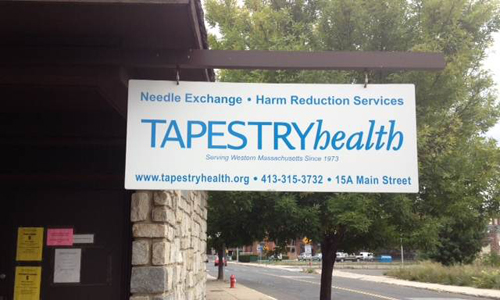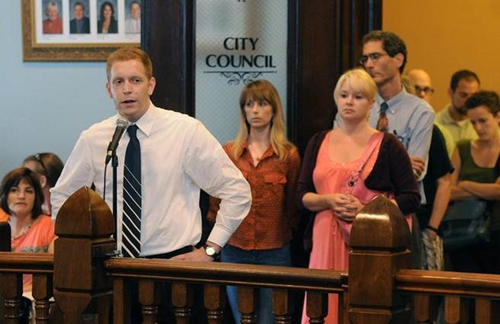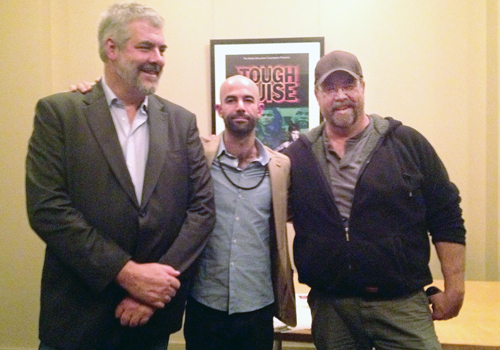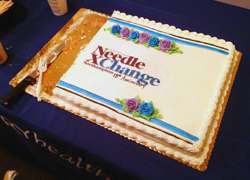
The entrance to Tapestry's SSP in Holyoke, Massachusetts.
On December 6, Tapestry Health’s syringe services program (SSP) in Northampton, Massachusetts, celebrated 18 years of successfully serving its community. A celebratory event included a screening of amfAR’s three-part short film series urging an end to the ban on federal funding for SSPs, an anniversary cake, a lively discussion of the ban, and a proclamation signed by Northampton Mayor David Narkewicz officially declaring December 6, 2013, Needle Exchange Day. However, as the city of Northampton publicly celebrated its program, Tapestry’s SSP in neighboring Holyoke was fighting to keep its doors open.
 Holyoke’s mayor, Alex Morse, speaks in favor of SSPs in front of the Board of Health.Tapestry Health provides a variety of healthcare services to eight communities in Western Massachusetts, but until last year only its Northampton branch offered an SSP. The Holyoke location opened in 2012 after the town’s young new mayor Alex Morse, 24, approved a unanimous Board of Health recommendation to open an SSP in the city. According to Tim Purington, director of prevention services at Tapestry Health, Holyoke has the state’s cheapest heroin—and its third highest rate of HIV infection. Injection drug use accounts for approximately 30% of HIV infections in Western Massachusetts, compared to 12% in the state as a whole, and 10% nationally. Despite the large need in the area, Tapestry’s two SSPs are the only two operating in that part of the state.
Holyoke’s mayor, Alex Morse, speaks in favor of SSPs in front of the Board of Health.Tapestry Health provides a variety of healthcare services to eight communities in Western Massachusetts, but until last year only its Northampton branch offered an SSP. The Holyoke location opened in 2012 after the town’s young new mayor Alex Morse, 24, approved a unanimous Board of Health recommendation to open an SSP in the city. According to Tim Purington, director of prevention services at Tapestry Health, Holyoke has the state’s cheapest heroin—and its third highest rate of HIV infection. Injection drug use accounts for approximately 30% of HIV infections in Western Massachusetts, compared to 12% in the state as a whole, and 10% nationally. Despite the large need in the area, Tapestry’s two SSPs are the only two operating in that part of the state.
 (Left to right) Tapestry’s Tim Purington, Naftali Beane Rutter, who directed the three amfAR short films, and Northampton City Council President Bill Dwight attend the Northampton SSP’s 18th anniversary celebration.“My first year as city counselor coincided with the exchange’s. I had a pony tail and a brother who had just died of HIV,” said Bill Dwight, now president of the Northampton City Council, as he introduced the films. “I was enormously proud that Northampton recognized that these are our neighbors, that the issue is us.” A woman in the audience agreed, saying that her son, a former straight ‘A’ student, had died of a heroin overdose when he was 18, and that Tapestry provided an essential service to the community. Like most SSPs, Tapestry Health not only prevents the transmission of HIV and hepatitis C by providing sterile syringes, it offers overdose prevention and other harm reduction training, addiction counseling, referrals to substance abuse treatment and programs, and HIV testing and counseling.
(Left to right) Tapestry’s Tim Purington, Naftali Beane Rutter, who directed the three amfAR short films, and Northampton City Council President Bill Dwight attend the Northampton SSP’s 18th anniversary celebration.“My first year as city counselor coincided with the exchange’s. I had a pony tail and a brother who had just died of HIV,” said Bill Dwight, now president of the Northampton City Council, as he introduced the films. “I was enormously proud that Northampton recognized that these are our neighbors, that the issue is us.” A woman in the audience agreed, saying that her son, a former straight ‘A’ student, had died of a heroin overdose when he was 18, and that Tapestry provided an essential service to the community. Like most SSPs, Tapestry Health not only prevents the transmission of HIV and hepatitis C by providing sterile syringes, it offers overdose prevention and other harm reduction training, addiction counseling, referrals to substance abuse treatment and programs, and HIV testing and counseling.
 The Tapestry Northampton SSP’s 18th anniversary cake.Soon after the Holyoke location started operations, several members of the Holyoke City Council opposed to SSPs sued, claiming the Board of Health violated the state’s Open Meeting Law because it did not post a notice alerting the public that it would be voting on the issue. A Massachusetts Superior Court judge denied the plaintiffs’ request to halt the SSP’s operations, but agreed that a City Council vote was needed to establish an SSP in the town. On the December 9, the Monday after the Northampton event, the issue was presented at a public hearing before the City Council Public Service Committee. The committee approved the local SSP by a vote of three to one and referred the order to a full council vote at its next meeting on December 17.
The Tapestry Northampton SSP’s 18th anniversary cake.Soon after the Holyoke location started operations, several members of the Holyoke City Council opposed to SSPs sued, claiming the Board of Health violated the state’s Open Meeting Law because it did not post a notice alerting the public that it would be voting on the issue. A Massachusetts Superior Court judge denied the plaintiffs’ request to halt the SSP’s operations, but agreed that a City Council vote was needed to establish an SSP in the town. On the December 9, the Monday after the Northampton event, the issue was presented at a public hearing before the City Council Public Service Committee. The committee approved the local SSP by a vote of three to one and referred the order to a full council vote at its next meeting on December 17.
“SSPs remain controversial in many towns, like Holyoke, in part because the federal ban fuels opposition to them, despite scientific evidence that they benefit communities,” says Chris Collins, amfAR vice president and director of public policy. Dozens of leading public health and medical organizations endorse SSPs, including the American Medical Association, the National Academy of Sciences, and the World Health Organization, and study after study shows that they reduce rates of HIV and hepatitis C without increasing drug use. Ending the ban would also benefit existing SSPs, which are often under-funded.
“Federal funding would have a dramatic impact and allow us to better serve the population, which is widespread in western Mass,” says Purington. “For instance, we could provide clients with transportation to inpatient substance abuse or treatment facilities. Here in Northampton, we don’t have those facilities, and people have to travel at least half an hour to get to them, and we have minimal public transportation.”
Learn how you can help end the ban.